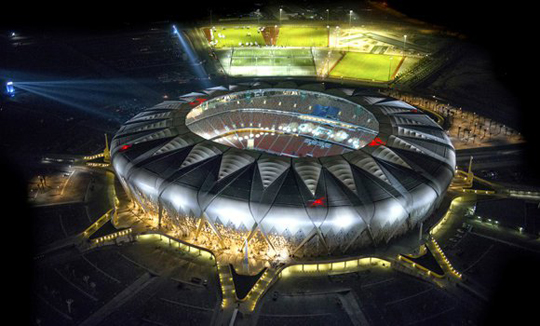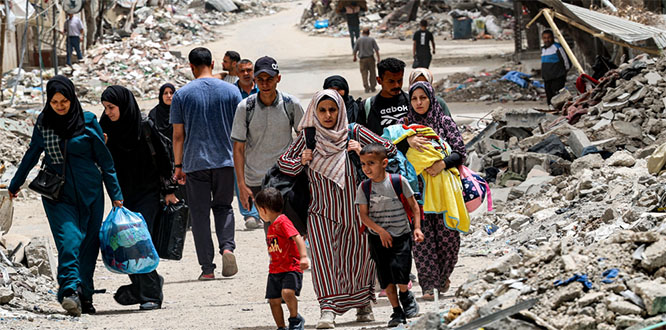Jeddah, Oct 31: Saudi authorities are not ruling out a nexus between the terrorist groups in Yemen and Daesh which plotted to bomb the Al-Jawhara Stadium in Jeddah on Oct. 11.

More time is needed to determine the nature of this link, Interior Ministry spokesman Maj. Gen. Mansour Al-Turki told a press conference Sunday.
A terror nexus is suspected because the targeting of the football stadium coincided with the launch of a ballistic missile from Yemeni territory.
He said the security forces foiled the plot to bomb the stadium during a World Cup qualifying match and dismantled two terrorist cells linked to Daesh.
Revealing more details about the plot, Maj. Gen. Attiya at the Interior Ministry’s Department of Investigation said that the stadium at the King Abdullah Sports City is one of the crowning sporting achievements of Saudi Arabia.
Built on an area of 3 million square meters at a cost of around SR2 billion, it has parking space for 20,000 vehicles.
He said that an operational middleman in Syria identified the target to the cell members, giving them the type of car they would use — a vehicle with a capacity to carry an estimated 400kg of explosives.
They had two options: Target the stands during the game which would have resulted in a partial structural collapse and the number of victims would have been higher, or to carry out the blast while spectators were exiting the stadium.
The blast’s impact would have been felt up to 1,100 meters away, covering almost 800,000 square meters.
Attiya said the Daesh terrorist group did not have a central leadership within the Kingdom, stressing that the previous Daesh scheme of dividing the Kingdom had been foiled within six hours in six regions.
Maj. Gen. Al-Turki confirmed that growing awareness within Saudi society about Daesh’s terrorist ideology is preventing citizens from joining the group.
Thus, the group had to recruit foreign residents in the Kingdom to carry out terrorist acts.
He said that the arrested cells had no communication among one another.
The ministry spokesman confirmed that the suspects whose names have been revealed by the ministry had committed many crimes in the Eastern Province.
The crimes included attacking security inspection posts and security centers.
They are also accused of killing a number of citizens, armed robbery of money transfer vehicles, robbing residents at gunpoint, and trafficking and smuggling drugs and arms.
Al-Turki called on the suspects to surrender to prove their innocence.
The names of the suspects, including a Bahraini national, have been revealed after their role in committing crimes in the Eastern Province were confirmed.
Maj. Gen. Attiya confirmed that the terrorist cell dismantled in Shaqra citywas founded in 2014.
Being colleagues of nearly the same age, the members of the terrorist cell lived in the city of Shaqra, 200km northeast of Riyadh.
Attiya noted that terrorist cell member Abdulaziz Da’jani requested the Daesh terrorist group to target security officers, stressing that in 2015 they began planning terrorist plots based on their beliefs.
At the beginning of 2016, they started to identify their goals and decided that their cell be dedicated to the assassination of security officers, Attiya said.
They identified seven goals across the Kingdom and bought weapons and ammunition and buried them outside Shaqra city, he added.
Abdulaziz Da’jani, Attiya continued, began making contact with Daesh to adopt their ideology. Da’jani communicated with the terrorist group via a Twitter account called “Al-Monaseroon.”
To prove his seriousness, Da’jani took photos of military vehicles and sent them to the “Al-Monaseroon” account in May.
Two months later — last July — the admin of “Al-Monaseroon” account contacted Da’jani and linked him to a middleman for Daesh in Syria.
Da’jani identified himself and the members of his cell to the middleman and asked him to facilitate their entry to Syria.
But the middleman refused and instead told them that all he requested from them was to carry out a suicide attack.
Da’jani told the middleman that carrying out suicide operations was difficult because of tough security.
Attiya added that the operational middleman in Syria identified himself to the Shaqra cell as “Al-Haramain official” and asked them to be completely loyal to him and pledge allegiance to the leader of ISIS, Al-Baghdadi.
He said that some of the coordinates of the sites in Riyadh, Tabuk and the Eastern Province have been identified where they intended to implement terrorist operations.
But security officers dismantled the cell on Oct.10 and arrested its members.
The major-general stressed that Daesh focuses on suicide operations because it believes suicide bombers are just tools.






Comments
Add new comment